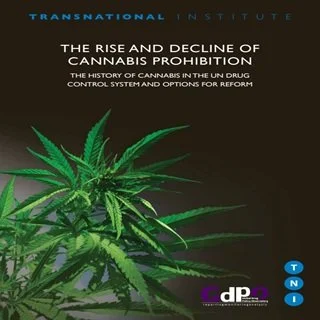The Rise and Decline of Cannabis Prohibition: The History of Cannabis in the UN Drug Control System and Options for Reform
By Dave Bewley-Taylor, Tom Blickman, and Martin Jelsma
Cannabis has long been a substance drawing much attention within the international drug control regime, a system currently based upon the 1961 Single Convention on Narcotic Drugs. Today the regime landscape is changing. Faced with particular challenges and democratic decisions, a number of jurisdictions are moving beyond merely tolerant approaches to the possession of cannabis for personal use to legally regulating markets for the drug. In November 2012 voters within the U.S. states of Colorado and Washington passed ballot initiatives to tax and regulate cannabis cultivation, distribution and consumption for non-medical purposes. Just over a year later, Uruguay legislated state regulation of the entire chain of the domestic cannabis market for medical, industrial and recreational use. These policy shifts go well beyond the permitted prohibitive boundaries of the UN drug control conventions. They represent a break with an historical trajectory founded on dubious science and political imperatives. And they have thrown the global regime into a state of crisis, as this report will argue. This publication is a joint effort of the Transnational Institute in Amsterdam and the Global Drug Policy Observatory at Swansea University. Research has been going on in various stages for about two years, and interim results were presented at the Seventh Annual Conference of the International Society for the Study of Drug Policy at the Universidad de los Andes, in Bogotá, in May 2013 and further discussed in an expert seminar on cannabis regulation in October 2013 in Amsterdam. Many academics, government officials and experts from NGOs and international agencies have provided useful comments on earlier drafts, but needless to say the end result is the sole responsibility of the authors. This final report will be first presented at the 57th session of the UN Commission on Narcotic Drugs (CND) in Vienna, 13-21 March 2014
Amsterdam: Transnational Institute / Global Drug Policy Observatory,
March 2014, 88p.


